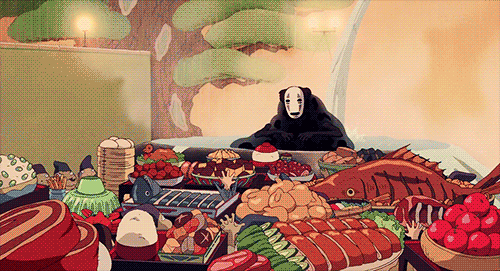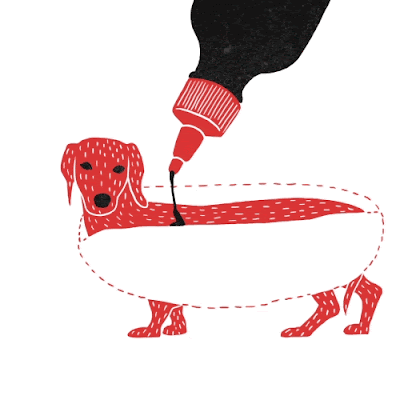Vegan 跟 vegetarian 其實不同派。關於各種「飲食派」的英文,這篇全介紹!吃素好處多,吃素可以救地球!
 |
| gif - Giphy |
眾生平等,有養寵物的同學,你一定不忍心將心愛的阿貓阿狗宰了吃掉。
嚴格來說,教練不是純素食者,因為我偶爾會吃奶蛋。頻率不高但我會吃,所以我是Lacto-Ovo vegetarian(奶蛋素)。如果機蛋的取得夠人道,不傷害雞,那是最好的了。其實許多該從動物身上得到的營養素,現在也能透過植物攝取到。教練不吃肉跟少攝取奶蛋快要八年了,坦白說當初不是為了健康吃素,而是因為基於同理心不想殺生。教練也不贊成某些宗教行為的放生換功德的活動。真正的放生,是在山產或是海產店看到有即將被屠宰的動物,心生惻隱之心,將這些動物買下來再野放的行為,大量購買動物然後集體放生,最後造成生態浩劫是錯誤的行為。
如此連奶蛋都不碰,那就是吃全素,這個字的英文是vegan。有些人之前以為vegan就是vegetarian 的縮寫,其實這兩個字的意思是完全不同的,vegetarian通常飲食除了蔬食外,還有攝取奶與蛋之類的dairy products動物性乳製品,可是vegan則是全部蔬食,完全不吃任何動物性的東西,包含奶蛋類。國外許多vegans是連動物性的製品都不使用,所以只穿純棉的衣服,拒絕羊毛以及絲綢還有皮件。
之前課堂上有介紹過carnivore(肉食性動物)、herbivore(草食性動物)與omnivore(雜食性動物),這幾年為了減少碳足跡carbon footprint,各國也大力推廣吃在地的食物,所以locavore 這個字也變夯(此字曾是牛津字典2007年所選出來的年度風雲字喔)。下面再介紹幾個相關的「食派」單字給大家認識:
1. Lacto-Ovo-vegetarian
奶蛋素者(這字因為太長,所以一般來說都會省略lacto奶-ovo蛋)
2. pollotarian
只吃雞肉的雞食者(也吃各種蔬果)。pollo在西班牙文中是雞的意思
3. pescetarian
只吃魚類以及其他蔬果的魚食者
4. freegan
為了環保理由不購買食物,只撿他人剩下的蔬果或 是掉下來的蔬食與肉類的自由食者(國外也有人戲稱這種人是乞食者)
5. flexitarian
大量攝取蔬果只吃少許肉類的彈性食者
下面這篇文章非常好,有很多實用單字,相信大家閱讀後又能增長見聞。
英文是一個不斷與時俱進的語文,很多新的字彙不斷出現,多閱讀新文章,就能提升字彙實力。最後祝大家閱讀愉快!
Where did the word “vegan” come from?
There are, of course, many ethical道德 and health controversies 健康爭議surrounding vegetarianism in all its different forms, but we wanted to know – where did the words come from? Who invented “veganism”?
Vegetarianism has been around for a very long time. Some historians date it back to Ancient Greek philosophers, and religious sects宗教的宗派 of Buddhism佛教 and Hinduism印度教 have encouraged vegetarianism for hundreds of years. However, the word itself came into common usage in the 1830s. During this era, vegetarianism was associated with religious conservatives保守人士, some of whom also campaigned for the temperance movement to ban alcohol禁酒運動.
It is not completely clear who invented the word “vegetarian.” It may have been the founders of the British Vegetarian Society英國素食協會 in 1847. Regardless, its linguistic roots語言學的根源 are very clear. The Latin word “vegetābilis” meant “lively or animating” and came to describe foods that made one lively or animated. The suffix “–arian” changes an adjective into a personal noun, as in librarian or veterinarian. From the 1840s onward, the word was in common English usage.
Why “vegan” though? Where did that short word that connotes暗示著 radical激進的 vegetarians come from? Donald Watson, founder of the Vegan Society, coined the word創造了…字/為某種字彙或是說法定調“vegan” in 1944 as a statement against vegetarians who ate dairy products. He took the first and last letters of the word vegetarian to create his orthodox version正統版本 of vegetarianism.
Today, as many as 10% of American adults say they follow a vegetarian-inclined diet以蔬食為主的飲食, but only 1% of them are strict vegans只有蔬食而不攝取奶蛋類(純蔬食派).
Today, as many as 10% of American adults say they follow a vegetarian-inclined diet以蔬食為主的飲食, but only 1% of them are strict vegans只有蔬食而不攝取奶蛋類(純蔬食派).
Most people who describe themselves as vegetarians are technically Lacto-Ovo-vegetarians奶蛋素; that is they eat eggs and milk. If you want to get really specific in describing your diet, you could use some of these terms: pollotarians只吃雞肉的雞食派(也吃各種蔬果) (if you eat chicken, but not meat from mammals), pescetarians(只吃魚類以及其他蔬果的魚食派) (if you eat fish), freegan為了環保理由不購買食物,只撿他人剩下的蔬果或是掉下來的蔬食與肉類的自由食派 (if you eat food only when it’s free).
Recently, a new word has entered the dietary lexicon飲食字典: flexitarian大量攝取蔬果只吃少許肉類的彈性食派. Though the term dates were invented in the 1990s, only in the past few years has it acquired common currency. The first flexitarian cookbook came out in 2008. Celebrity chef Mark Bittman advocates提倡 for a “plant-based diet” meaning one that focuses on plants but can include a little meat.
Michael Pollan’s book The Omnivore’s Dilemma雜食者的兩難 uses a different nomenclature學名命名法 to talk about similar issues. By calling us “omnivores雜食者,” Pollan suggests that we should not be herbivores草食者 (or carnivores肉食者, for that matter). The language he uses closely resembles the words that biologists use to talk about animals. Owls are carnivores; rabbits are herbivores. As with most attributes屬性/特性, though, we prefer to have different adjectives to describe the same behavior in animals and in humans.











哇,原來有這麼多區別啊!感謝分享
回覆刪除是啊,細分的話真的有這麼多。西方人有很多只吃魚或雞的,所以這些人也自成一派。
刪除I'm a pure vegan. No milk or eggs.
回覆刪除Good for you. I wish I could do that. I sometimes eat eggs and drink milk. Some of my friends are vegans, but they sometimes cheat a little by consuming dairy products because being a vegan can be difficult if you have to work or can't cook three meals a day at home. Big cities are usually not very vegan friendly.
刪除You usually eat three meals out? Your company doesn't offer vegetable food?
刪除I can't drink milk. I'll have diarrhea, gas and bloating...Besides, 印光大師said "牛奶食之無礙,然亦係取彼脂膏,補我身體,亦宜勿食"
刪除I recommend you drink "益力壯-給力或桂圓“ . Ever heard of this? It's a nutritional supplement drink. I drink this over two weeks. Have more energy.....The problem is I got bloated and a bit diarrhea because it contains a bit 牛奶、黃豆原料。= =” I'm still considering whether to keep drinking it or not.
刪除I cook my own meals, and normally, I only eat two meals a day.
刪除I rarely eat out these days.
Some people are lactose intolerant, and they can't drink milk. I don't have that problem but I don't drink milk on a daily basis. Well, I don't like the smell and the taste of soy, therefore, I don't drink soymilk that much. I probably should. Thank you for the recommendation, I'll give these items a try.
Wow, after three years, you're still only eating two meals a day? Is that the 16/8 intermittent fasting? I actually tried 16/8 for a month or two (can’t remember exactly) and really lost some fat—my abs looked more defined! I want to start doing it again tomorrow!
刪除You're probably lactose intolerant, that's why you can't drink milk or eat dairy products. I don't have that problem so I can consume milk or dairy, but I still prefer soy milk. I don't do intermittent fasting anymore, but I either skip lunch or eat very little after four pm. Fasting alone is not enough, you need to do cardio and resistant training to boost your muscle mass at the same time.
刪除